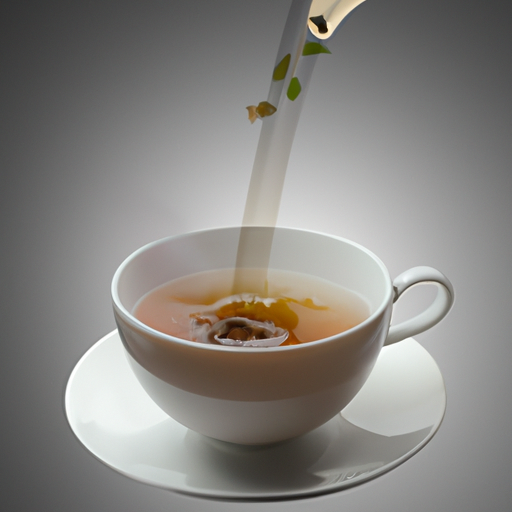Step into a world of wellness and indulge in the delights of oolong tea, a versatile and potent drink that offers a plethora of health benefits.
Like a gentle breeze caressing your senses, this delightful beverage derived from the camellia sinensis plant embraces you with its unique flavors and tantalizing aromas. With a perfect balance between green and black tea, oolong tea captivates both your palate and your well-being.
Within its leaves, buds, and branches lie a treasure trove of antioxidants, including catechins and EGCg, known for their remarkable health-promoting properties.
Sip your way to vitality as oolong tea aids in weight loss, prevents obesity, lowers blood pressure, and even improves sleep. It possesses an anti-hyperglycemic effect, making it a valuable ally for those with type 2 diabetes.
Furthermore, oolong tea supports a healthy gut microbiome, inhibits the growth of cancer cells, reduces inflammation, and protects against neurodegenerative diseases.
Let the enchanting powers of oolong tea unlock a world of wellness for you. Join me as we delve into the unique benefits, components, and disease prevention capabilities of this extraordinary elixir.
Together, let us embark on a journey towards a healthier and more vibrant life.
Key Takeaways
- Oolong tea is a versatile type of tea made from the leaves, buds, and branches of the camellia sinensis plant.
- Oolong tea contains both green tea and black tea compounds, including catechins and other antioxidants.
- Oolong tea may aid in weight loss and prevent obesity.
- Oolong tea may improve sleep due to its GABA content.
Unique Benefits
I’ve learned that oolong tea offers a range of unique benefits, including weight loss support, blood pressure regulation, improved sleep, and protection against neurodegenerative diseases like Parkinson’s.
When it comes to weight management, oolong tea has been shown to aid in weight loss and prevent obesity. It contains compounds like catechins and EGCG that help boost metabolism and increase fat oxidation.
Additionally, oolong tea can help regulate blood pressure, especially GABA tea, which has calming effects on the body. This can be beneficial for individuals with hypertension.
Moreover, oolong tea may improve sleep quality due to its GABA content, promoting a more restful night’s sleep.
Lastly, oolong tea’s antioxidants and polyphenols have been found to protect the brain against neurodegenerative diseases and enhance cognitive function.
In terms of gut health, oolong tea has been shown to improve the gut microbiome and support a healthy balance of bacteria, which is important for overall digestive health.
Components and Compounds
Oolong tea contains catechins, powerful antioxidants that are known to have numerous health benefits, including reducing the risk of cardiovascular diseases. These antioxidants help protect our cells from damage caused by free radicals, which can lead to chronic diseases like heart disease and cancer.
One particular compound found in oolong tea is EGCg (epigallocatechin gallate), which has been extensively studied for its health effects. EGCg is known for its anti-inflammatory properties and has been shown to help reduce the risk of various diseases, including cancer and neurodegenerative disorders. It also plays a role in weight management by increasing metabolism and promoting fat oxidation.
Additionally, EGCg has been found to improve brain function and enhance memory and attention. With its high content of antioxidants, oolong tea is a potent drink that can provide numerous health benefits.
Disease Prevention
To prevent diseases, it is important to incorporate oolong tea into my daily routine. Oolong tea offers a wide range of benefits for specific diseases, making it a powerful addition to a healthy lifestyle. One of the key advantages of oolong tea is its ability to support immune health. The antioxidants found in oolong tea, such as catechins, help strengthen the immune system and protect against harmful pathogens. Additionally, oolong tea has been shown to have anti-inflammatory properties, which can help reduce the risk of chronic diseases like cardiovascular disease and cancer.
To illustrate the benefits of oolong tea for disease prevention, here is a table showcasing some specific conditions and how oolong tea can help:
| Disease | Benefits of Oolong Tea |
|---|---|
| Cardiovascular disease | Reduces vascular inflammation and lowers cholesterol levels |
| Cancer | Inhibits breast cancer cell growth and reduces the risk of ovarian cancer |
| Diabetes | Anti-hyperglycemic effect, beneficial for people with type 2 diabetes |
| Neurodegenerative diseases | Protects the brain against neurodegenerative diseases like Parkinson’s |
By incorporating oolong tea into my daily routine, I can take proactive steps towards maintaining my health and preventing these diseases.
Frequently Asked Questions
Can oolong tea be consumed by pregnant women?
Pregnant women should avoid oolong tea to ensure the safety of their pregnancy. It is important to prioritize the well-being of both the mother and the baby.
How does the taste of oolong tea compare to green tea and black tea?
Oolong tea has a unique taste that falls between green and black tea. It has floral and fruity flavor notes, with a hint of sweetness. To appreciate its taste, try steeping it at different temperatures and durations.
Is it necessary to add sweeteners or milk to oolong tea for a better taste?
Adding sweeteners or milk to oolong tea isn’t necessary for a better taste. In fact, enjoying oolong tea without sweeteners allows you to fully experience its natural flavors and reap all the health benefits it offers.
Can oolong tea be consumed by individuals with caffeine sensitivity?
Yes, individuals with caffeine sensitivity can still enjoy oolong tea. Oolong tea contains caffeine, but the levels can vary depending on the type. For those who are sensitive, herbal teas or decaffeinated oolong tea are potential alternatives.
Does oolong tea have any known side effects or interactions with medications?
Oolong tea may have some side effects, such as caffeine sensitivity, gastrointestinal discomfort, and allergic reactions. It can also interact with certain medications, like blood thinners and anticoagulants, so it’s important to consult a healthcare professional before consuming oolong tea.
Conclusion
In conclusion, oolong tea is truly a magical elixir, brimming with health benefits that can transform your well-being.
Picture yourself sipping on a warm cup of oolong tea, feeling its antioxidants coursing through your veins, protecting your body like a shield.
Imagine the gentle aroma enveloping your senses, bringing tranquility and peace to your mind.
With each sip, envision your weight melting away, your blood pressure lowering, and your sleep becoming more restful.
Oolong tea is not just a beverage, but a natural remedy that can enhance your health and vitality.
So why not indulge in this versatile and potent drink today?










